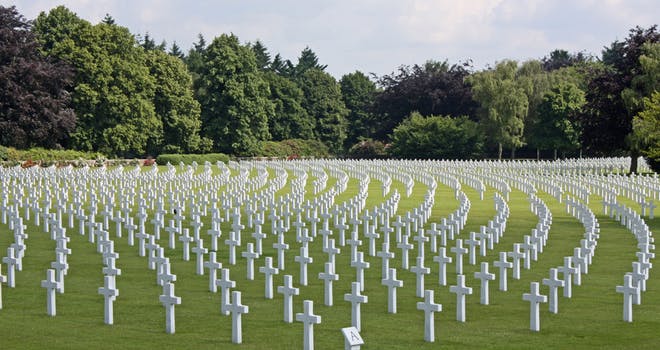How to Make Money in the Death Business
When it comes to the business of death, you have many options. This is an article about opportunity. Personal growth from decay.
We live in a death fearing society, predominantly Christian and Catholic, which fears hell, fire and brimstone. There are so many references and reminders of death in our culture, specifically in the United States. Many people glorify death through action movies, stories, politics and news. Much of the news speaks of death, destruction and mayhem. Death is even embedded in our education system. For example, the traditional teachings of Catholics and Christians, even in public schools, where we learn about Dante’s Inferno. Dante’s Inferno contains different cantos that depict different stages of hell. Death is also mentioned in the Bible which we hear referenced many times in certain stories. It is not just ancient writings that bring up the topic of death, but it is also in more modern works of fiction such as James Joyce and even in philosophical writings like the ones written by Camus, Nietzsche, and Kierkegaard. Stephen King is a person who always writes about death in some way, as does Clive Barker and many other of the horror fiction writers and authors that are in the world today, all profiting from death. Even our present day modern spiritual teachers like Eckhart Tolle, Gangaji, Tara Brach and Byron Katie often remind us of what happens when we get old. They tell us that we’re running out of time and that there’s not a lot left for us to do. Death is right around the corner and they keep reminding us of this while also encouraging us to appreciate life more. They continue to tell us to remember that we’re mortal and that we could die a sudden, unexpected death. It could happened at the blink of an eye. We live in a death-fearing culture and I will discuss how you can enter the death business and make money off of it. Now, one of the central ideas I want to sell you on is that because we are constantly reminded of death, it impacts a lot of our decisions. Whether it is to take on employment or to go to school or to continuously be on the rat race trying to make ends meet. While we are spending a bunch of time and effort doing these things, sometimes we actually end up sacrificing our lives and lose our ability to stay present in the moment. We forget to just enjoy the fact that we’re living right now. Mark Manson, who wrote the book The Subtle Art of Not Giving a F*ck, says we all have immortality projects, that many people are ego-driven and believe firmly in their personalities, their characters and who they are as individuals. They believe that the things they do, the projects they’re involved in, the business enterprises they pursue are all meant to feed on the ego and to create something that will last forever. Which is actually, if you think about it, an impossible task because eventually we will be dead and life will go on and the sun will explode and the earth will be no more. Cheery, isn’t it?
When you realize that everybody is trying to desperately cling onto an image of who they are and what they offer to the world and that they desperately want their contributions to society to last for an eternity, which is a very long time, this is when you can turn that fear into cold hard cash before they turn into a cold dead corpse. Strike while the body is warm!
In the death business, there are actually many different types of occupations. For example, there’s the funeral director and this position is mentioned in the book Endings: A Sociology of Death and Dying by Michael C. Kearn. In the book, Kearn describes the funeral director as being basically an entrepreneur because death is an evergreen business. In other words, it continues and its popular and it’s profitable. If it weren’t profitable, there would be no funeral directors. We’d all be tossing our friends and family in the nearest compost pile and hoping they add a little pep to next year’s roses. According to Michael C. Kearn, the funeral director almost always has an establishment. And from there, it just gets better. He has a magazine or newsletter that he distributes to potential customers who have relatives in nursing homes, in a hospice, or in hospitals where they have terminal illnesses. This funeral director may loom amongst his target audience that might have a need for his services, especially those who identify with certain religious beliefs that mandate a person who dies needs to be buried and receive a holy communion (or just a party). Replete with people dressed in black, who come as mourners to mourn the person who lived with lots of pictures, bouquets, and flowers. Many times the funeral director will hire an embalmer to make the person in the coffin more presentable and to also send out invitation cards to people involved in the funeral. So there’s actually a huge business in funeral directorship, which also has a universe of other specific businesses attached to it in a wider sphere of death-business. Of course, many funeral directors have establishments that are very different and vary according to their religious beliefs, the amount of money that could be spent, and just the type of ambiance being striven for. In Endings, Kearn speaks of the different types of coffins you can have. I will get into this a little bit later, but needless to say, there are catalogs of coffins where you get to select the type of wood, the type of color, the style you’re going for, the ambiance you want, and essentially what you come to discover is the commercial aspect of death. Being a funeral director and organizing death as if it’s a wedding we learn can be very lucrative indeed. As there are wedding planners, so shall there be death planners, and no I don’t mean the disgruntled ex stalking you, I mean professionals. In terms of other businesses in the funeral business, the embalmer is another great (as in lucrative) field! Perhaps there’s an organ player too who can also be of assistance! These people, along with the funeral director, are in the death-planning and death-performing businesses. At a funeral there is a funeral director who organizes the event. Then there is the embalmer-cum-artiste who dresses the body and makes it so presentable that no one even sees death in the corpse. Also there is the organ player to create a solemn-and-holy atmosphere, until she breaks out into a wild rendition of “Take Me Out To The Ball Game”, which really livens up a funeral. There are priests and people who can talk at funerals. Finally, there are people who are into cremation who will basically burn the body to make it into ashes for you to spread wherever you like. Another potential position where you can market off of death is the forensic examiner position. A forensic examiner is someone who looks at bodies and studies what happened to a person the moment they were killed or the moment they died. They use the evidence on the body to derive a story that’s plausible, believable, and that could help explain the cause of death. In a murder case, for instance, the evidence can eventually lead to the capturing of the perpetrator of a crime. In another scenario, it could also lead to a practical explanation for how a person committed suicide. They’re also body farms where people go to study decay and study the erosion of bodies and how they kind of become bloated and then sink into the earth, the science of decay.
There’s a whole industry and niche field on victims alone.
There are victim counselors, people who study victims and who aid them, they are our grief counselors, actual therapists who go to court and speak to people who have been victimized by a person, place, or thing. And if you are wondering, those counselors need counselors after people unload all their terrible life issues on them, so it’s a cyclical business. This may lead to a slew of different sessions with a therapist where they will discuss the next steps for alleviating the grief and move life forward and hopefully delay your entry into the light a little longer and help them to not fear the reaper. There are also many ways where people can work to help those who have been victimized in natural disasters, deux ex machina, like hurricane Katrina. It involves a lot of interaction with other people and a lot of sensitivity and active listening and a lot of the “therapeutic touch” that you’ve learned in clinical counseling schools. Again, there are many ways to benefit in the death business. Even the slightest hint of death can actually prime you into having subconscious death fears and your own impending demise. So many authors do profit off of this. However, at a more general level, certain professions also have ways to profit off of people’s death fears, and I’ll describe how below. One example are lawyers for inheritances and will money when people die and such professionals need to kind of figure out who is entitled to what in a person’s will. Another example is the staff for hospice and hospitals and nursing homes. These people are caretakers and watchers of people who are close to the brink of their own demise. So all of these different positions for different businesses are making money and profiting off of people’s death fears. I only happen to mention a very short list of opportunities. In reality, all the professions I have mentioned have many other specific jobs within them. So I do want to impress upon you the fact that the list that is here is by no means exhaustive and that there are actually many other types of paths one can go down in terms of profiting on death and destruction. So I will briefly go over the positions I discussed above in more detail, so by the end you should have a good understanding of how people can profit off of death and more importantly, how you can too.
Funeral Director
Funeral directors have their own identity, but they also do a lot of things that entrepreneurs, themselves, are used to doing. For example, they send out mass mailings, direct mail and catalogs. They also monitor targeted populations who have relatives who are in a hospice, a hospital, or a nursing home; and they send out letters and postcards to advertise their establishments to people who might be interested in holding ceremonies there for when their loved ones eventually depart. The funeral director is someone who stages the eventual contract signing. They gain the interest of a person who is a prime candidate for their services. At the same time, they try to provoke those death fears. It’s through the the provocation of a person’s fears of death that a funeral director is able to secure many clients who do fear death and the ramifications of not holding a good funeral. What they do is they advertise their funeral homes to people… who can pay for funeral homes. As I mentioned earlier in the introduction, such homes come in all shapes and sizes as do coffins, which can also be shaped into all sorts of things, like rocket ships (as Kearn mentions). There are coffins that are in the shapes of Chevrolet’s or Mitsubishi’s or Toyota’s and there are different ways of adorning the ceremony when the person has departed, like adding blown up photos and even playing their favorite song while people have to endure someone’s poor choice in music. The funeral director also stages and performs and organizes the funeral for the person who believes that there should be a funeral for someone who has died. Remember, there are really no rules for what should happen when a person dies. We make them up, through culture, our upbringing, and our death fears. Funerals create a catharsis, a sense of closure for families and loved ones and also it is a bit of publicity for the “mourner,” to let other people in the community know that the person had loved ones, that they were involved in the community and that they’re setting up a funeral that is for their dearly departed. This comes with advertisements, obituaries, ad space that gets sold—announcements all around of a person’s recent loss. These are just a few of the ways a person can endear themselves to the public, but it’s also a way of creating closure while bringing people together and creating a bonding experience through this funeral gathering.
Funerals also make people not fear death as much.
When it’s time to go, you’ll know that someone else has your back and write that eulogy that highlights your own accomplishments in life. It’s a little interesting that many people seem to imagine themselves looking down on the attendees of their own funeral, similar to the way Ebenezer Scrooge looks at his own tombstone when the Ghost of Christmas Future shows him the possibility for a timely demise.
So the funeral director is in a position of profiting off of these such irrational fears.
All of these tasks are a part of the business of being a funeral director. In addition, there is a lot involved in the actual job itself. You have to rent or purchase the space. You have to plan the arrangement of flowers, the way the tables are set up, the way everything is organized, the music that is played. You’d have to prepare the bodies themselves, make sure they look acceptable for viewing, and they don’t look a zombie, or at least a decomposing zombie. You have to know whether it will be an open casket or a closed casket; and make sure that the coffin is exactly the one that the client is specifying and this is all part of the duties of being a funeral director.
Forensic Examiner
The Forensic Examiner is somebody who studies bodies for evidence, looks at bodies to determine who the possible perpetrator is. They take what is on the body and they glean from it a plausible story or a narrative that helps explain how the body was murdered and how the body came to the present state of decay. So a forensic examiner looks at the body and tells a story about it, a plausible one. They create a hypothesis that can then be further studied and explored even further for possible solutions. So if the forensic examiner is on the hunt for a serial killer, for example, then the forensic examiner will look for evidence that the crime was a sexual one, or that it was a crime of passion or that it was a robbery gone wrong. Or if it they were just a winner of the Darwin Awards.
Or if it really was a slip and fall that ended in a comedic yet terrible way.
The other type of forensic examiner is someone who studies suicides and they can also study bodies and their decay. Although it’s mostly forensic anthropologists and forensic scientists who do study specifically the deteriorating bodies such as the ones that are found on the famous body farm in the United States. The forensic scientists study apoptosis as well, which is cell suicide, but they also study the way the body melts into the earth afterwards. These are all ways that people can profit off of the immediate death of somebody, but also benefit off of the slow and gradual deterioration of a person who has been dead for weeks and months. Death is a business that will never die! Mary Roach in her book Stiff: The Curious Lives of Human Cadavers, speaks a lot about her exploration of the body farm and talks very humorously about the way she perceived the body farm and the way it operated (so to speak). It’s a book I highly recommend if you’re fascinated about this topic and perhaps interested in pursuing this line of work. There are professors who actually show dead bodies in classes occasionally, especially in criminal justice schools, to present the kind of evidence that they have explored in their own professions. The immediately dead carcass or the body that has been dead for a long time has a lot of profit potential, being studied from all angles, both for its anatomy as well as the story it reveals. The bodies can be examined for special insightful clues that help people understand their own bodies and humanity in general.
Grief and Victim Counselors
These people speak to victims after a natural disaster or after someone has committed a heinous crime or terrorist attack. These are people who thrive off of the suffering and the trauma of other people, financially anyway. People who have experienced war and famine and plague and natural disasters, terrorist attacks, serial killers, spree killers, and all phenomena that lead to death and the demise of humans, even genocide. Basically, flowers and unicorns. There are grief counselors for all types of situations where death occurs because death is an extremely scary situation for people and it causes people to have constant compulsory thoughts about what is going to happen to them. Grief counselors’ jobs are specifically geared to help people get over these worries instead of constantly being on edge. They try to relieve people of their experiences encountering death or as they might call it, “curing people of post-traumatic stress disorder,” and they try to get people to finally be in the world again, to live for life and not for death. In a way, they are trying to delude people so that they can function with the rest of our death-ignoring civilization.
Hospice Caretaker
You know there are a lot of baby boomers right now who are going to be experiencing their slow and gradual demise acutely, more so than the rest of us, and some will indeed know that they do have a finite time to live, until they move on and others will even know the actual time in which they will cease to exist. Hospice caretakers are individuals who take care of and monitor a person as they’re beginning their slow and gradual decline into oblivion. Hospice caretaking is a particularly popular position as there are lots of staff needed for these places. There are various types of hospices, some have different accommodations, some hospices are for wealthier people, and some are for less wealthy. It all has the same type of business approach as a hair salon, but it’s for death. Many people are working in these types of centers where they will provide food and drink, they’ll provide entertainment, they’ll give concierge service, and provide conversation to people who are starting to decline, they will interact with the guests. This is a very interesting way of trying to get people more comfortable and more situated in their ultimate fate–death.
Spiritual Teacher
As I mentioned, Eckhart Tolle, Gangaji, Byron Katie, and Tara Brach all emphasize our untimely demise, at least in some way. In their lectures, audio series, their interviews and their books, in every kind of product that they have and spinoff products and gifts and premiums and interview appearances they all kind of speak to their brand as spiritual teachers, but also as disseminators of information about death.
Many other philosophical teachers and gurus think and conceive about this vast topic, hypothesize about it, ruminate about it, dwell on it, and bring these thoughts of death up in their lectures and remind people that life is short, and it’s not going to be a long time. Often after these long lectures many of the audience seek the cold embrace of death. These teachers remind us that we should live in the present. They say that there’s nothing to worry about, yet they bring up death fears anyway and encourage us to think in a positive way that will make us more comfortable with death. Even though oftentimes it has a reverse effect. Their teachings could emphasize death for us even more so that we become even more anxious and more existential. We are not sure about where we’re going in life and that makes us think about the future that hasn’t even happened yet. Although I’m certain all the spiritual teachers are well-intentioned people, they oftentimes do resort to the death card, so to speak, to try to get people to buy into their programs and to buy what they’re saying and to really support it. I would say a majority of the spiritual teachers target individuals who are older, who see their life as passing them by very quickly and who are people who are faced with the next stage of their life, which is death. So this is another way that you can profit off of death in the future by becoming a spiritual teacher of some sort, by being a disseminator of eastern and western philosophies and talking about death and what happens to you when you die, and most importantly what people think happens to you when you die.
Death Authors
This isn’t just limited to people who write about death, but it also extends further to jobs in this field. Just writing about success and being prosperous at work or in business is another form of marketing to death because if you think about it, people want to be successful so that they can avoid tragedy and a certain level, a certain symbol of death. For example, when we are “fired,” or “terminated,” or our contract is “retrenched,” these words are all somewhat symbolic of death. This is also mentioned in Michael C. Kearn’s book Endings, but I want to highlight that a lot of the vocabulary that we use to refer to failure and being out of a job, being unemployed, not having a successful business, all the words that we use to label these situations all connect to death in a way. Like when you leave a job, there’s also a certain death in that you no longer are talking to your colleagues. You’re no longer reporting to the same place. You are no longer talking to the same boss. You essentially disappear from that company’s world and in a way it’s a very symbolic death, and many authors do like to prey upon people’s fears of these sorts of deaths, but ultimately the truth is you’ll never actually escape these death fears. You will always encounter life and death in your own existence because the two go hand in hand. Lovely, isn’t it? People will come, people will go, and that’s the way life is. Opportunities come, opportunities go, there’s a birth and eventually a death. So there are many ways that you can profit as a writer on these different fears of loss. People are very afraid of loss and they’re afraid of losing themselves and losing their sense of accomplishment, of achievement, the personality and very idea of who they are, and this extends not just to horror writers or people who are into action and adventure, but it also extends to people who are writing about money, writing about finding work, writing about being psychologically resilient, being flexible and being creative and being impervious to loss, and that is one way that you can actually profit off of death. You can profit off of people’s sense of losing something, of not having something that they can keep with them forever because there is no forever for us. We live in a cycle and it’s finite. Even as a social scientist you can profit off of this, describing phenomena and death fears almost the way Ernest Becker did with his concept of mortality salience. This same concept brought up earlier in this article where people are reminded of death and thus cling more to their values, their cultural references, their beliefs and their sense of who they are. Their claims to their sense of personality and their mind. There’s also a philosophical way of approaching death, like I said before, with Camus and Nietzsche and even Mark Manson, all of whom take philosophical approaches to the study of death. They hypothesize about what life really is, what it means if anything, what we’re all doing here. Similar to the way that the spiritual teachers also speak about eastern and western philosophy, but the spiritual teachers are also more about application as opposed to doing what most of the philosophers do, which is fear theorizing and hypothesizing and speculating and running thought experiments about possible scenarios for the way that life is and the way that death is. There are many ways that you could profit off of death as a death author and not just as a fiction writer. It’s not always immediately clear to people that there are underlying death symbols and symbolism in certain books that talk about loss. So consider this.
Honorable Mentions
I just want to honorably mentioned the people that I would have spoken about in more detail but due to the limits of space… and time, I can’t cover them in more detail (ironic, isn’t it?). In any event, it seems pretty self-evident that these people are in the death business in one way or another. So the people who get honorable mentions in this chapter are lawyers and priests and scientists. I kind of lumped them and chunked them into the section on Forensic Examiners earlier in this chapter because essentially forensic examiners and forensic scientists all kind of do the same thing. There are also doctors who are also in the death business as well. They kind of prey upon people’s fears about death and about their imperfections and about maintaining optimal health and staying fit for a long time, not letting your youth pass you by (plastic surgery anyone?). By extension, the alternative medicine people also get an honorable mention. These are the people who study Reiki, energy, vibrations and frequencies and people who speak in tongues and gibberish to contact beings in other dimensions, as well as the people who live on Prana and light. These are all people who also find their own angle in describing death and what happens toward the end of life and living a full and complete existence and having no fear about what is to come.
Fitness gurus again, are in the business, and this should be obvious by now if you’ve read this far. Lawyers, especially criminal lawyers, deal with death constantly.
Conclusion
So this has been a conclusive study on the death business.
I mentioned employment opportunities for the most part. However, within these employment opportunities, you hopefully get a good sense that there’s property to be purchased, businesses to be registered and certain areas where there are growing populations and communities and as you know, where there’s people, there’s death. So a lot of ideas I hope you will get from the study of all of the employment opportunities I mentioned and the ramifications for starting your very own death business, replete with joy, sadness, and money. I hope you’ll be able to see for yourself that there are many ways you can indeed profit off of death and by not necessarily even mentioning death. Just by simply mentioning the loss of something, the loss of your identity and loss of your personality, the loss of your sense of self, the loss of your sense of success, the loss of your sense that you’ll be able to be someone in this world, the loss of a loved one. All of these senses of loss you can profit off of in many different ways without necessarily directly stating the obvious that death comes. We often don’t need it directly stated to appreciate this fact. You can remind people of death through metaphor! Finally, in an ironic twist to end this exposé, there are people who give us hope such as the people who are in the cosmetics industry, the people who are trying to sell the fountain of Youth Formulas to help people stay young and healthy and feeling a sense of immortality. And there’s also that way of being able to profit off of death by profiting off of life and having a more optimistic sense of your brand that emphasizes rejuvenation and too big to fail, indestructibleness. So you can profit off of death by emphasizing life and by emphasizing youth and vitality and vigor. That we are also creating technologies to supply us with this hope for a better more sustained future also speaks to this sense of optimism that you can profit on, optimism for non-death. Sometimes the best way of profiting off of death is through the avoidance of death. So there are many ways you can profit off of death as an employer or an employee (or both as the case may be). And I mentioned some of them. They’re by no means an exhaustive list, but it’s certainly meant to get you started down this road. So best of luck to you in your journey to death!
Author Bio:
Todd Squitieri holds a BFA from New School University and an MA in Applied Sociology from William Paterson University. He has taught in over 5 countries, and currently resides in Da Nang, Vietnam where he is writing a book about his experiences. He may be reached on his website at www.ToddSquitieri.com.











